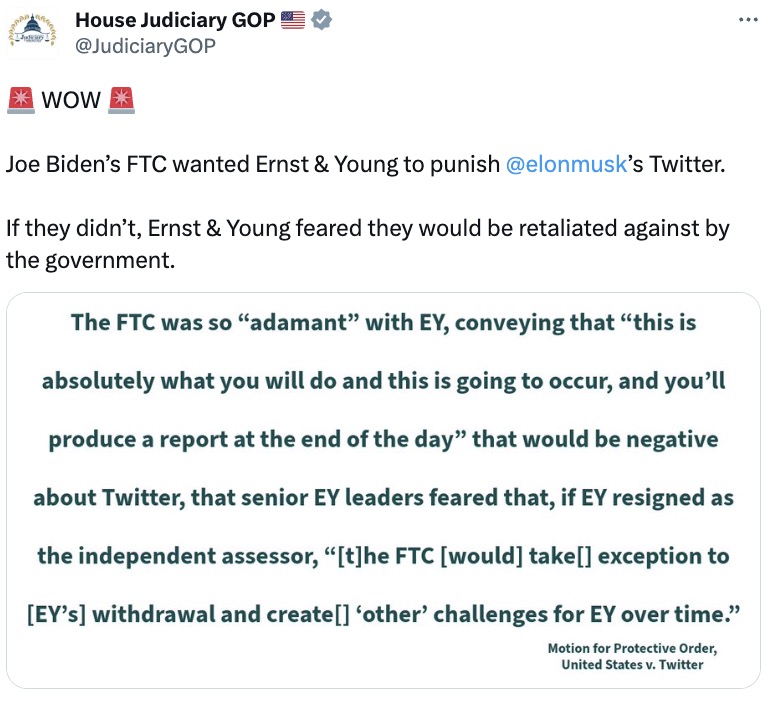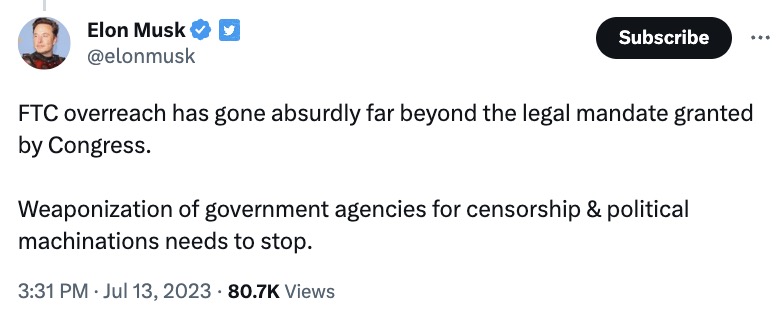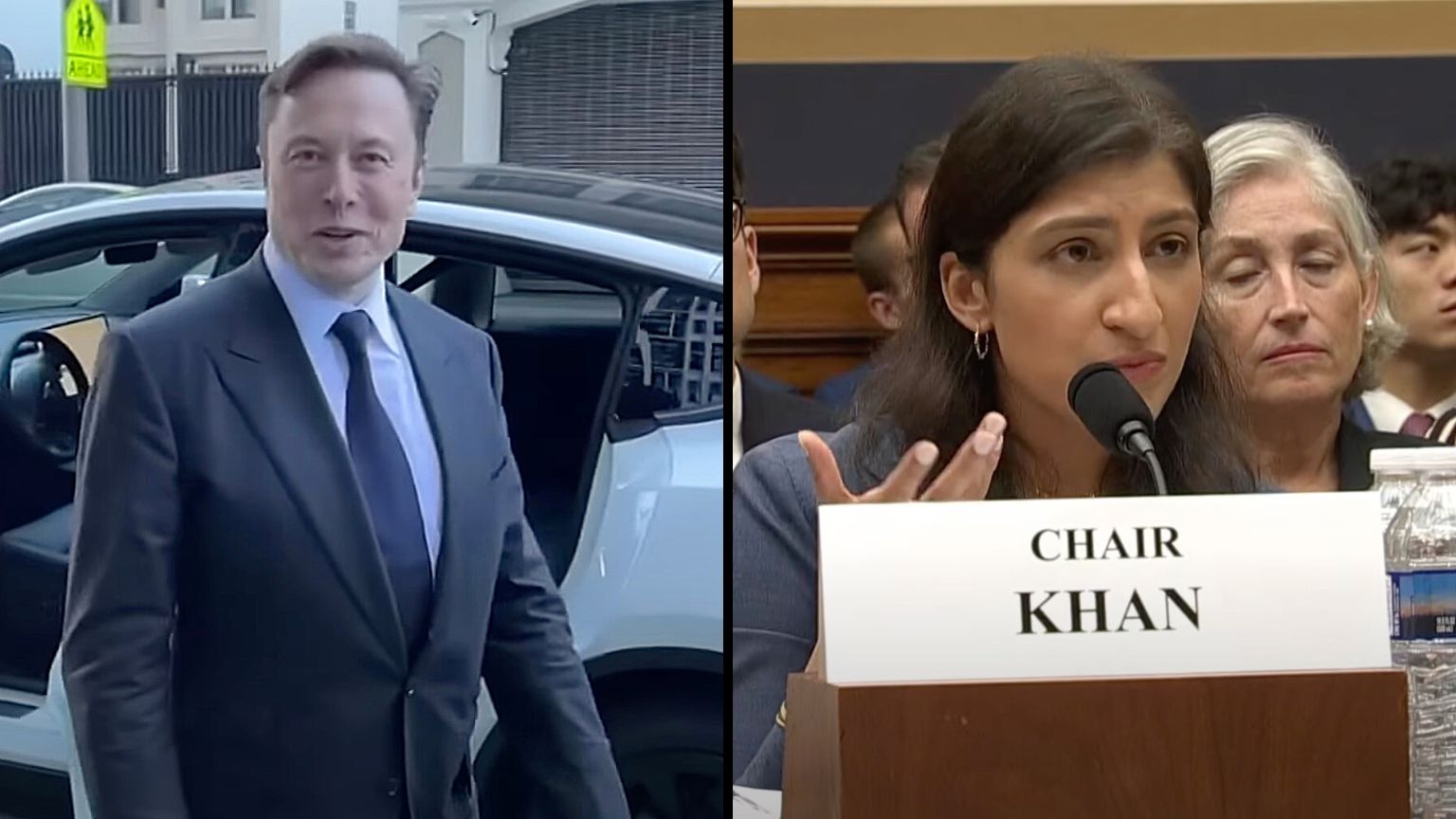Twitter, helmed by Elon Musk, has petitioned a federal court to annul an agreement with the Federal Trade Commission (FTC) addressing alleged privacy infringements, describing the FTC’s investigative approach as “burdensome and vexatious.”
In a similar way that accusations have been leveled at the FBI when it comes to suppressing speech, X Corp’s (Twitter’s parent company) move has followed allegations that the FTC is being weaponized against Twitter after Musk’s proposals to create a free speech platform. The FTC was also today accused of potentially violating the First Amendment over the demands it made of Twitter.
Tensions between the FTC and Twitter escalated into a hearing that saw Republican members of the House clash with FTC Chair Lina Khan on her agency’s probe into Twitter and perceived antibusiness sentiments. The FTC’s scrutiny pertains, at least on the surface, to Twitter’s commitment to user privacy.
But concerns over the FTC’s actions have been voiced by the House Judiciary Committee Chairman, Rep. Jim Jordan (R., Ohio), and fellow Republicans.
They contend that this intense scrutiny stems from Twitter’s choice to support free speech, leading to allegations of politically motivated harassment.
Citing a desire for confidentiality in FTC proceedings and pledging impartial enforcement of law, Khan has refrained from providing the panel with subpoenaed documents linked to the ongoing investigation.
The extent of this scrutiny has led some Republicans to accuse the FTC of exceeding its jurisdiction.
In a hearing held on Thursday, Jordan pointed to details from Twitter’s court documents indicating a sense of influence from the FTC even before commencement of the review.
The information in question originates from an Ernst & Young employee hired as a third-party auditor under the FTC order.
The employee at the the consulting firm brought in to assess Twitter’s practices, said in a deposition he thought the FTC was “trying to influence the outcome of the engagement before it had started,” according to the court filing.

Amidst claims of bias, X Corp beseeched the US District Court in Northern California to stop the FTC from wielding judicial power for what Twitter perceives as an investigation divorced from lawful intentions. In the legal documents, Twitter criticized the FTC’s unyielding demands for information, stating that it has already produced in excess of 22,000 documents.
It has also requested the court to halt Musk’s FTC deposition, arguing that Musk is not part of the consent order between the company and the FTC, which follows an earlier FTC agreement from 2011.
In a move that has sparked significant controversy, the FTC, in March, has from Twitter a comprehensive list of all journalists that have been privy to the company’s internal documents, in addition to all communications related or directed towards Elon Musk, the company’s CEO.
The FTC asserts that this is standard procedure, though critics, including House Republicans, see the action as politically driven and as a grave encroachment on press freedom, as was brought up in today’s hearing by Jim Jordan.
The FTC’s demand was included in a series of 12 letters sent between November 2022 and February 2023. In these, the FTC instructed Twitter to disclose the names of journalists and other media representatives who were given any access to the company’s internal communications since Musk’s acquisition of the company. The nature of the access these journalists were granted was also requested.
In what has come to be known as the Twitter Files, the FTC has asked Twitter to provide all internal communications—including but not limited to emails, memos, and Slack communications – that pertain to Musk or were directed or received by him.
Additionally, detailed data regarding company layoffs and its Twitter Blue subscription service were requested.
The FTC’s supposed legal foundation for these demands is rooted in a consent decree established between the FTC and Twitter in 2011, which was expanded in 2022. The initial order mandated Twitter not to misrepresent the usage of its user data.
Twitter settled an FTC suit for $150 million in 2022 for violation of the earlier decree, which alleged the company utilized user phone numbers and email addresses for advertising purposes under the guise of account security. An expanded consent order followed this settlement, which according to FTC Chair Lina Khan, is “much more prescriptive, much more detailed” than the initial order.
The FTC defends its inquiries, contending they are integral to verify that Twitter is safeguarding consumer privacy and refraining from improper usage of user information.
In opposition to the FTC’s claim, the House Republicans of the Judiciary Committee published excerpts from the FTC’s letters to Twitter in a larger report, arguing that the FTC’s demands on Twitter have no logical basis in user privacy. The report mentioned that there’s no reasonable cause for the FTC to know the identities of journalists communicating with Twitter, scrutinize Twitter’s personnel decisions, or require every internal Twitter communication concerning Elon Musk.
The report proposed that the FTC’s latest probe into Twitter, which started a few weeks post Musk’s acquisition of the company, was politically driven. This came amid demands from Democratic lawmakers and progressive groups. The FTC has since issued more than 350 requests for information during Musk’s tenure as CEO.
In the initial stages of the hearing today, Jordan brought up the claim that the FTC, having issued over 350 requests for information from Twitter including Musk-related communications, was targeting the company excessively. He labeled such behavior as unacceptable and akin to practices seen in unstable political environments, rather than the United States.
Moreover, the FTC’s request for communications between Twitter and journalists with access to internal Twitter data has attracted further criticism from Jordan.
In contrast, Khan underscored the importance of ensuring Twitter’s adherence to the consent order, given the company’s access to sensitive data of millions of Americans and its privacy violation history dating back to 2010.
Despite Jordan also referencing Twitter’s allegations of the FTC’s bias in its privacy investigation, Khan maintains her unfamiliarity with such claims and emphasizes the FTC’s commitment to examining the privacy and security implications of Twitter’s decisions.
In 2011, Twitter agreed to a consent decree due to privacy violations. Subsequently, before Musk’s takeover, the company consented to pay $150 million to settle an FTC and Department of Justice case which found Twitter guilty of deceiving users about the use of phone numbers collected for account verification, thereby violating the consent decree.

In addition to the ongoing tension, Twitter revealed that Musk’s requests for a meeting with Khan were deferred until Twitter fully complied with all FTC requests. On Thursday, Musk expressed his dissatisfaction with the FTC’s actions on Twitter, accusing the agency of misusing its powers for political purposes.










